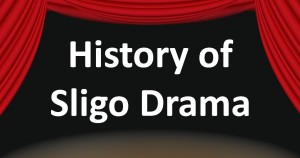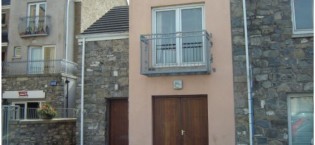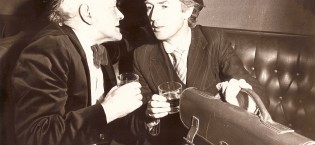A Survey of Theatrical Activities in Sligo: The Season’s Plays
 With the departure of “The Country Boy”, except of course, for the half-whispered promise of a look into “Sharon’s Grave” and maybe the belated arrival of a “Witness for the Prosecution”, the play-going season in Sligo has ended for the year. What kind of season was it? Except for the promise of joy and fulfilment of happiness offered in “The Country Boy” it was one of theatrical gloom, and but for the Drama Circle’s “Montserrat”, one in which the local groups broke no new ground or enriched very much the old. There are three active drama groups in Sligo town. There appears to be little or no co-operation among these groups and it would further appear that at bottom – the Sligo Drama Circle partly excepted – they are strongly conservative and their approach to playing is incapable of any greater development.
With the departure of “The Country Boy”, except of course, for the half-whispered promise of a look into “Sharon’s Grave” and maybe the belated arrival of a “Witness for the Prosecution”, the play-going season in Sligo has ended for the year. What kind of season was it? Except for the promise of joy and fulfilment of happiness offered in “The Country Boy” it was one of theatrical gloom, and but for the Drama Circle’s “Montserrat”, one in which the local groups broke no new ground or enriched very much the old. There are three active drama groups in Sligo town. There appears to be little or no co-operation among these groups and it would further appear that at bottom – the Sligo Drama Circle partly excepted – they are strongly conservative and their approach to playing is incapable of any greater development.
This year each group presented a tragic play. In “Montserrat”, seven people are shot and a nation tortured; a father and mother kill their son in “The Blind Wolf”, and in “Aftermath” a mother ruins her son’s life and destroys his peace of mind. Were it possible for these groups to discuss in autumn what they hoped to do, and so, plan a programme of plays that would prevent overlapping, and give the public a varied selection of dramatic works, it would be a step in the right direction. It has happened that two comedies and two plays of the thriller type have been given by different groups during the same seasons. The audience comes to the play to be entertained, not to be educated or consciously uplifted. Accordingly, the choice of play is important because, in the first place it must have drawing power and, in the second place it must be worth producing. The festival-minded group considers its choice as potential marks on an adjudicator’s sheet but this should not be their main consideration. With a few notable exceptions, the plays presented by the local groups over the past few years have been well chosen and on the whole they have been well supported by the public.
Since the third group was formed, almost four years ago, up to twelve plays have been presented by the local players. Have the groups, which work hard and endeavoured to give of their best, had an influence in increasing the play-going public? Have they made the public more drama-conscious? It is pleasing to note that the support of the players has remained fairly constant but sad to relate that in general the influence has been slight and the attendance at performance has not noticeably increased. The fact that the recent presentation of “Sive” packed to capacity the cinema where it was presented indicates nothing except extreme curiosity. People who might not go to a play again for years went to see it because half its fame had come before it.
Sligo audiences are no better or no worse than those in almost any other town in the country. We have the reputation, how we got it heaven knows, of being very critical of anything that is not the best. Perhaps the standards of the Feiseanna gave rise to this, but it is absolute nonsense. Listen to a dispersing audience coming down the stairs in the Town Hall after a play. All one hears are various grades of praise, from the ecstatic to the mild, usually in that order. This is hardly indicative of a critical audience. Perhaps in private conversation more forthright opinions might be expressed but it is the public expression which can do good. In one respect we are much worse than audiences in other country towns. Too many of us come late. It is all very well to say that the show will not start on time. If the audience was there the show would start. This has become a chronic complaint. The only way to cure it is for the play, concert, lecture or whatever is it, to start at the time announced. With the Feiseanna in the offing, and the audiences for the Prize-Winners Concerts notorious for their late arrival – at one of these concerts within the past two years the performance did not begin till forty five minutes after the advertised time and there were still people from the town, yes, from the town, coming to their reserved seat – is it too much to hope that the Committee will announce, and maintain, a punctual start for their Prize-Winners’ Concerts.
The three plays presented by the town’s groups have been discussed and reviewed in this paper already. There is no need to do so again. The general notices were, to say the least of them, very favourable. In view of such pleasing notices the groups should guard against complacency and not allow themselves think their efforts were perfect. All amateur production, of its very essence, cannot be perfect. A professional one can be and sometimes is. When our groups are playing they should forget the word amateur and endeavour to put before the public the nearest thing to perfection they can achieve. The slip-shod and casual should be banished. Nothing but the best in production, acting, lighting, and setting should be good enough. After all the people who pay to see the play should get top value for their money. Attention to detail in production and setting is of utmost importance and nothing is too small to correct if it will improve the presentation.
In “Montserrat” the period is around the first decade of the nineteenth century, yet the armchair used by the Sligo Drama Circle was one of a type whose hideousness did not spoil a room for almost another seventy years. A pain in this production, on two occasions, Izquiredo, a colonel in the army of Spain no less, took and drank from a glass which had been used already. On one of these occasions it actually contained liquid which had been poured, and partly drunk, by another player. In “The Blind Wolf” on a couple of occasions the actors made use of gestures which gave a completely wrong and entirely misleading idea to the audience of the immediate situation and its subsequent development. Was Mrs. O’ Regan, in “Aftermath”, so fond of her battered peeling, glass-fronted crockery press that she took it from the poverty of her cottage in Act I to the wealth of her daughter-in-law’s fine place in Act III? In fact, except for the absence of Myles O’ Regan’s books, this set was a replica of the set in Act I with the props turned the other way. These are only pin-pricks? No. Points like these take the edge off a production and indicate that lack of aim at perfection which cannot be excused. They are also an affront to the audience.
The producer should see to it that his (or her) cast is steeped in the play and fully aware of its story. A character in “Montserrat” speaks of the Goya portrait of the Spanish royal family. One look at a reproduction of this picture would have made the cast realise that those who were to portray the freedom-seekers had a good reason for their fight, while those on the side of authority needed all their loyalty to uphold the rule of a family whose meanness and stupidity were so apparent. In “Aftermath” more so than in “The Blind Wolf”, though both by the same author, the rich simplicity of the language should have encouraged the players to love speaking it.
Next season is very far away. Already though, it is whispered that a Shakespearean play is being considered by one group. They would be well advised to forget it. The only amateurs who can get away with Shakespeare are college-boys and school-girls. They can be forgiven much. Let us hope that when the new season comes it will bring with it interesting plays, fresh approaches, higher standards, and indeed, the same hard work and sincere effort which made this season, if not memorable, quite successful.
(The Sligo Drama Circle, good luck to them, have made an almost complete tour of the festivals, and have collected cups of silver and medals of gold. Highly creditable work. Maybe, when they return from Athlone – not before they go – they’ll let us see what they did with their play that made it such a winner.)
from The Sligo Champion, by Tadhg Glennane, April 16th, 1960
Tags: Drama in Sligo, History







